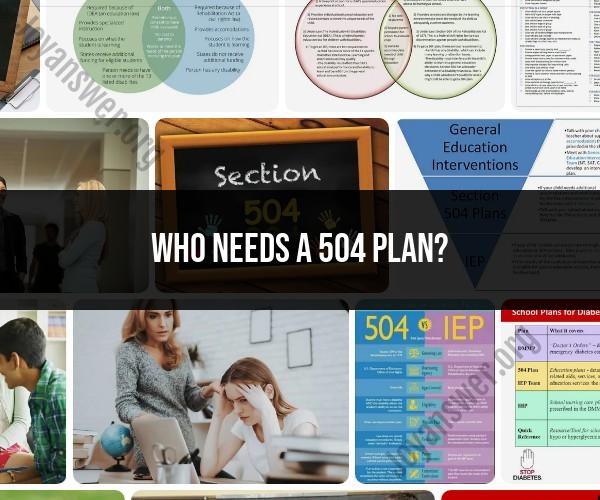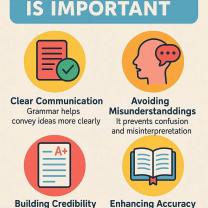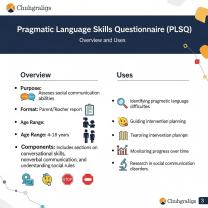Who needs a 504 plan?
A 504 plan is a legally binding document in the United States that provides accommodations and support for students with disabilities who attend public schools or institutions receiving federal funding. These plans are designed to ensure that students with disabilities have equal access to education and are not discriminated against based on their disabilities. Students who may need a 504 plan include those with:
Physical Disabilities: Students with physical disabilities that substantially limit their ability to access and participate in school activities may require a 504 plan. This can include mobility impairments, chronic health conditions, or injuries.
Medical Conditions: Students with medical conditions such as diabetes, severe allergies, epilepsy, or asthma may need accommodations to manage their conditions while at school. This can include access to medications, dietary considerations, or medical monitoring.
Mental Health Conditions: Students with mental health conditions like anxiety disorders, depression, bipolar disorder, or ADHD (Attention-Deficit/Hyperactivity Disorder) may require accommodations such as counseling, additional time for tests, or modified assignments to support their emotional and academic needs.
Learning Disabilities: Students with learning disabilities, such as dyslexia, dysgraphia, or processing disorders, may need accommodations like extra time for reading, writing, or testing, or the use of assistive technology.
Speech or Communication Disorders: Students with speech or communication disorders may require support in the form of speech therapy, communication devices, or additional time for verbal responses.
Sensory Impairments: Students with sensory impairments, such as vision or hearing loss, may need accommodations such as Braille materials, sign language interpreters, or assistive technology.
Chronic Health Conditions: Students with chronic health conditions like Crohn's disease, cancer, or autoimmune disorders may need accommodations to manage their health needs during the school day.
Temporary Disabilities: Students with temporary disabilities resulting from accidents or medical procedures may also require 504 plans to ensure they have the necessary support during their recovery.
It's important to note that eligibility for a 504 plan is determined on a case-by-case basis. The decision involves a collaborative process that typically includes parents or guardians, teachers, school administrators, and relevant professionals. The goal is to create an individualized plan that meets the specific needs of the student and provides appropriate accommodations to ensure their academic and overall success in the school environment.
If you believe your child or a student you know may benefit from a 504 plan, it's essential to initiate the process by contacting the school's special education or 504 coordinator to discuss the student's needs and eligibility. The school will then conduct an evaluation to determine if the student qualifies for a 504 plan.
Who Qualifies for a 504 Plan: Understanding the Criteria
To qualify for a 504 plan, a student must have a physical or mental impairment that substantially limits one or more major life activities. Major life activities include caring for oneself, performing manual tasks, walking, seeing, hearing, speaking, breathing, learning, and working.
Some examples of physical and mental impairments that may qualify for a 504 plan include:
- ADHD
- Autism
- Cerebral palsy
- Cystic fibrosis
- Dyslexia
- Epilepsy
- Hearing impairments
- Learning disabilities
- Mental health conditions such as anxiety and depression
- Muscular dystrophy
- Orthopedic impairments
- Speech impairments
- Visual impairments
504 Plans in Education: Determining Eligibility
In order to determine whether a student is eligible for a 504 plan, the school district will conduct an evaluation. The evaluation may include a review of the student's medical records, academic records, and behavioral records. The school district may also interview the student and their parents or guardians.
If the evaluation determines that the student is eligible for a 504 plan, the school district will develop a 504 plan for the student. The 504 plan will identify the student's impairment, the accommodations or modifications that the student needs, and the person who is responsible for implementing the 504 plan.
The Need for a 504 Plan: Identifying Qualified Individuals
A 504 plan can be a valuable tool for students with disabilities. It can help them to access the education they need and to succeed in school.
Here are some examples of how a 504 plan can help students with disabilities:
- A student with ADHD may be allowed to take breaks during class or to have extra time on tests.
- A student with dyslexia may be allowed to use a computer to take tests or to have access to audiobooks.
- A student with a visual impairment may be allowed to sit at the front of the class or to have enlarged materials.
- A student with a hearing impairment may be allowed to use a sign language interpreter or to have access to note-taking services.
If you think that your child may be eligible for a 504 plan, talk to their teacher or school principal. They can help you to start the process of getting your child evaluated for a 504 plan.












